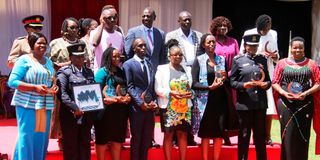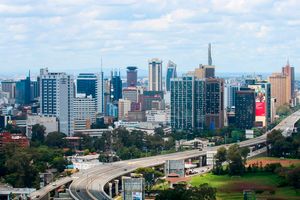
A group of trailblazing women after being awarded by President William Ruto during the International Women’s Day at Moi Stadium in Embu County on March 8, 2024.
As we celebrate International Women’s Day, we honour the trailblazers who paved the way for us. Since its inception in 1910, this day has been a symbol for women’s equality. Today, we continue to champion women’s leadership across all spheres, recognizing the incredible achievements and contributions women make globally. In a time of such world-wide turbulence let’s celebrate the excellence of African women and the progress we’ve made in advocating for a future where every woman can be their best.
“Accelerate Action” is the theme for International Women’s Day 2025, and serves as a rallying call to not only recognise and support existing efforts but also to commit to concrete actions that amplify strategies for advancing gender equality. This theme emphasizes the need for scaled-up efforts to drive meaningful progress for women globally.
Climate change is often framed as a crisis of rising temperatures, shrinking forests, and extreme weather. But at its core, it is also a crisis of leadership — of who gets to make decisions, who gets access to resources, and who is empowered to drive change. The truth is, we will not solve the climate crisis without women equally at the table.
As it stands, at the rate we are going, gender parity will only be achieved in 2158, according to the World Economic Forum - in stark terms that is 133 years from now! In any other sector, this growth metric would be completely unacceptable. It is evident that women continue to be marginalized in leadership, underfunded in business, and disproportionately affected by global crises — none more so than climate change.
More sustainable economies
This week, I had the profound honour of commemorating Wangari Maathai Day, which is also Africa Environment Day. I grew up watching my mother turn what seemed like a simple idea of planting a tree, into a grassroots movement, to restore the land, and communities. She knew that women were the backbone of their communities and they were also the first to feel the impact of deforestation and environmental degradation. So, she mobilized them as powerful agents of change - the roots of what became the Green Belt Movement, that has since its inception planted over 51 million trees and empowered thousands of women to take charge of their environment and their futures.
Her life’s work continues to be a testament to the power of grassroots action, then and now, with people across the world still planting trees in her memory.
However, the environmental challenges she fought against still persist, and it is women who continue to bear the brunt of deforestation, land degradation, and climate disasters. They are at the frontline, suffering the impact of climate change and need real tangible support in the fight for climate justice against the greed and short-term interests of individuals, corporations and governments who threaten the forests in Kenya and across Africa. The UN estimates that 80 per cent of people displaced by climate change are women and girls. We must accelerate climate action and must recognise that women are not just part of the solution — they are at the core of it.
Across Africa’s drylands, a transformative movement is underway. Women are leading the charge in regenerating degraded lands, pioneering innovative agro-ecological solutions, and building more sustainable economies through movements like Restore Local and the Great Green Wall. However, despite their remarkable achievements, they face significant barriers to recognition and support. It’s striking that at COP28, women made up only 34 per cent of delegates, despite comprising nearly half of the global population.
Community-driven solutions
The core issue of climate action is financing, and in the recent UN biodiversity (COP16) talks in Rome, countries agreed and pledged to address this issue through a global fund for nature protection to help meet the 30x30 goal — protecting 30 per cent of the planet’s land and seas by 2030. However, there is still no clear roadmap for ensuring that these funds reach the communities and nations that need them most. Additionally, the plans for a fund are also at risk as the trend by the biggest polluters (aka the wealthiest nations) of aid cuts and freezes jeopardizes development efforts across the continent and puts African communities at risk.
The fact is that when funding does exist, and on the rare occasions it prioritises and reaches women, the impact is magnified. We also have research showing that countries with higher female representation in government are more likely to ratify international environmental agreements, and when women farmers have equal access to land, tools, and financial support, agricultural productivity increases by up to 30 percent, reducing both food insecurity and environmental degradation.
Beyond the numbers, we know that women lead differently. They build community-driven solutions, think long-term, work collaboratively, and prioritize sustainability.
For decades, women have been leading where it matters most. Now, it’s time for the world to put them at the centre. For this International Women’s Day, as we reflect on how to “Accelerate Action,” let’s move beyond rhetoric and put real power, resources, and trust into the hands of women.
My mother often reminded us that “the earth does not belong to us—it belongs to future generations.” If we are serious about protecting it, we must recognize that women are not just part of the solution — they ARE the solution.
Wanjira Mathai is the MD for Africa & Global Partnerships at the World Resources Institute and Chair of the Wangari Maathai Foundation.







